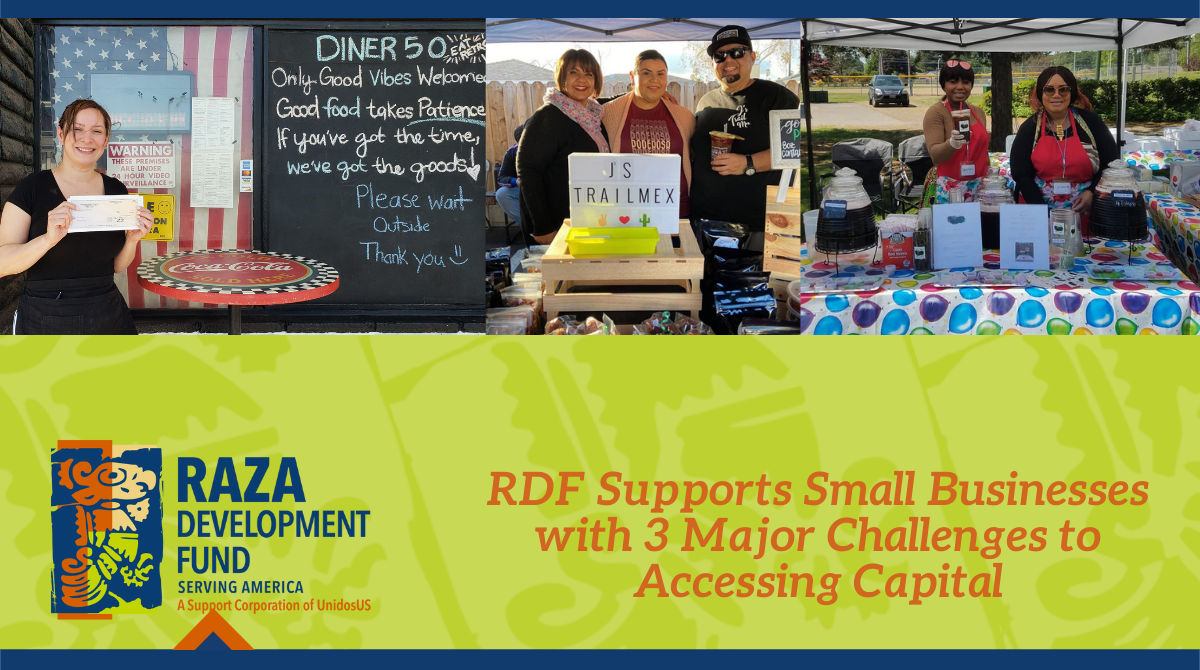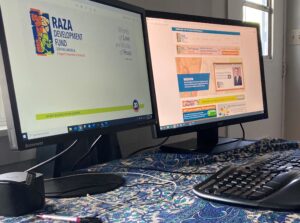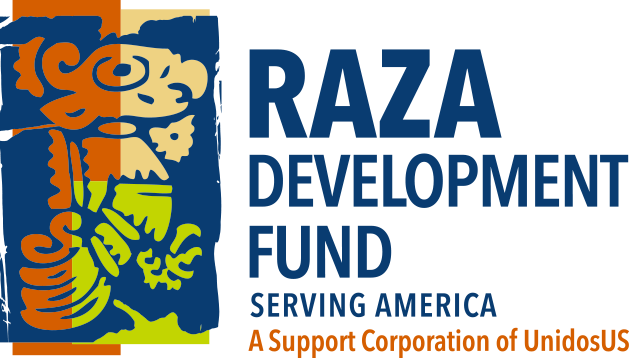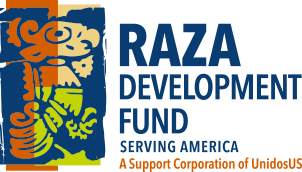RDF Supports Small Businesses With 3 Major Challenges to Accessing Capital

Raza Development Fund’s Small Business Initiatives team is committed to supporting our micro and small businesses. Due to recent pandemic closures and constant changes, our small businesses have been hit hard, with many struggling to keep their doors open.
According to the Small Business Administration, SBA, small businesses are the lifeblood of the U.S. economy creating two-thirds of net jobs. It’s imperative to support our small business owners, especially during these turbulent times.
At RDF, we’ve supported 489 small businesses through the SBA’s Paycheck Protection Program (PPP) loan process. Last year, our Hope Fund provided grants to 111 small businesses. In doing so, we helped keep these businesses open, retained jobs, and invested in our local communities.
While there are options for small businesses, it’s not always easy for them to access capital.
- Lending with Heart

For a financial institution, lending to small businesses is more expensive than lending to large businesses. Small businesses are considered a high risk of default, meaning they may be unable to repay their loan. Every loan has a fixed cost for the lender that’s the same no matter the size of the loan, whether it’s a $50,000 microloan or a $5 million loan. Therefore, the lender’s profit margins are higher for bigger loans. This means, many lenders may only offer small businesses loans with a higher interest rate in order to recoup that loss of profit.
With that said, taking out a loan can still be beneficial for a small business owner. A good loan can help the owner establish good credit and enable them to expand their growing business.
Luckily, Community Development Financial Institutions, like RDF, exist to offer additional options for small businesses than the traditional bank loan. For example, RDF was able to help many small businesses get approved for the PPP loan that were otherwise denied by other institutions.
- Proper Financial Structure
 Many times, a small business owner’s personal finances are intermingled with those of their businesses. For example, many small business owners, especially in Latino communities, employ family members for day-to-day operations. And as family, they are often paid non-traditionally such as in cash or they volunteer as a familial favor.
Many times, a small business owner’s personal finances are intermingled with those of their businesses. For example, many small business owners, especially in Latino communities, employ family members for day-to-day operations. And as family, they are often paid non-traditionally such as in cash or they volunteer as a familial favor.
Unfortunately, this makes it more difficult to be considered for a micro loan. Lenders need to see proof of business income, which includes payroll documentation, to consider approving a loan. In other words, they need to know the business owner is profitable enough to pay back the loan. This is difficult to assess if the business finances are not properly structured.
Luckily, there’s a solution. A small business owner can seek an accountant to help organize their financial information. Family employee relationships don’t have to go away. An accountant can simply advise the owner how to best document payroll specific to their needs.
At RDF, our Small Business Initiatives team has worked diligently with our PPP clients this past year to help provide technical training in programs like QuickBooks to guide owners in establishing an improved financial structure for the success of their business.
- Small Businesses Need Access to Online Resources
 To adapt to the times, small businesses need to be able to access the internet to gain access to capital.
To adapt to the times, small businesses need to be able to access the internet to gain access to capital.
While working with small businesses with PPP, our Small Business Initiatives team worked with a lot of businesses that had never had an online presence or even access to technology. However, in order to complete the PPP application, they needed to submit materials online. Many of our clients got online for the first time without any basic technical computer skills.
Online resources can also help small businesses create sources of revenue. Especially during the pandemic, small businesses that were able to create online shops and connect with customers on websites and social media had a better chance of thriving. In fact, our team saw small businesses making their online presence their primary way of business.
RDF: A Community Resource
Last year, we moved our previous corporate headquarters in downtown Phoenix to return to our roots in South Phoenix. This fall, we look forward to inviting the community to enjoy the space with us. It will be more than just a corporate office; it will be a community hub where we can offer technical assistance workshops to help our local small businesses thrive.
There, we can offer even more resources. At RDF, we partner with other organizations and community leaders to build a network of resources for our clients. For example, the Arizona Hispanic Chamber of Commerce and Fuerza Local provide additional coaching clinics to guide owners to make the best decisions for their business.
The bottom line: there’s hope and resources available for small businesses. The very purpose of CDFIs (Community Development Financial Institutions), like RDF, is to provide options and opportunities for those who may otherwise not have access to traditional forms of capital. To us, it’s all about investing in our communities to strengthen each other for success.




